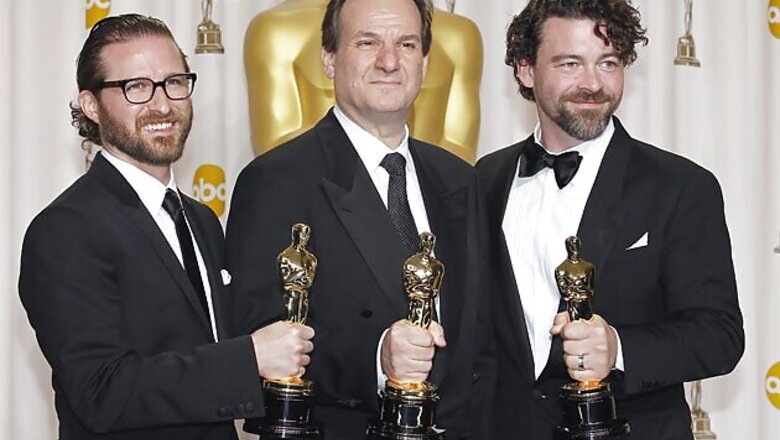
views
New Delhi: Martin Scorsese's 'Hugo' gave all other films a run for their money when it bagged five Oscars. Though it did not score above the other competitors for 'Best Picture' - it bagged the 'Best Visual Effects'. The men behind that achievement were Rob Legato, Joss Williams (absent), Ben Grossman and Alex Henning.
Here's the backstage interview with the winners -
Q. I have a question about the locomotive accident scene. I was, uhm, I read somewhere that that was actually good old handmade, uhm, visual effect and not using the graphics of computer graphics. Could you please tell me why you chose that route.
A. [Legato] We actually had a combination of the two. The last drawing was specifically designed for a physical model to crash through to imitate the Montparnasse famous black and white shot, and we added two more shots that were real traditional models and the rest of them were computer graphic models that were modeled to be able to be seen side by side with the real one and be, you know, indistinguishable from the two. [inaudible]
A. [Grossmann] The reality is the question was: Why did we choose to use a model a modern day miniature instead of the newer modern technology digital. We used digital where it was appropriate and we used a model where it was appropriate too. And models and miniatures are classic techniques. Aside from being an homage to the subject of the movie, Georges Melies and his techniques, there's still the better solution you get when something looks real, and when you can do that, you should. And we did.
Q. Hi congratulations. In the category that was filled with a lot of really great computer animation and the flight motion capture excuse me how does it feel for you guys to have this tribute to Georges Melies to have used some of his actual techniques and to have won an Oscar for a blend of practical and computerized visual effects?
A. It was a particular thrill for us because a lot of what we did is very subtle things to be basically the same level of the art form of the other categories photography, and art direction, and all that it encompasses within a visual effects into the celebrating the life of those early pioneers. We chose on every occasion we could to use techniques that might have been used by Georges Melies himself, and some to great effect, and the subtle blends of all those things and what we were trying to achieve with a, hopefully, a degree of art that we would want to evaluate our portion of the program. So, that kind of is our drive and we are very proud of the fact that we got recognized for the art of it as much as the technology of it.
Q. Congratulations everybody.
A. Thank you.
Q. You won for visual effects and the marriage of visual effects and stereo. Talk about that marriage, and how this movie has helped to change that.
A. [Legato] I will start. I'll give it over to Ben. What we are trying to do with the 3D of the movie itself is to basically extend the art form of cinema by using the depth that you get and every shot was designed to take advantage of the depth that we would enhance the model of the story. So, every shot was literally made to be in 3D and designed to give you some depth or emotional response from it. Then the hard part is what these gentlemen had to do which is to actually perfect the 3D in a very complicated way, but I'll turn it over to them and they can explain.
A. [Grossmann] I don't think it needs to be explained too much better. Really, we had fun with it. And there's a lot of science behind it, but we try to take the science and distill it down to something that is so simple that it doesn't interfere with your instinctive creativity so you can hear Marty or Dante or Bob, and say what they feel the shot should emote. And then have the technology and the skills down to a simple direction, so that we can move in that direction effortlessly, I think, without encumbering ourselves with 10 pages of science and research; although, it's all still there. Alex can probably explain some of that.
A. [Legato] Alex will say something.
A. [Henning] Well, like they said, I think it's just about keeping it to be a story telling device. More than anything else and not just doing for the sake of doing it. I think that's what Marty really set out to do, and what his whole crew was after and by extension, us. And, uhm, evidently, it kind of worked, because here we are.
A. [Legato] And it's very complex, these guys are underselling to make it appear to be seamless.
A. [Henning] I was looking up Euclidian formulas quite often, and that's not a joke.
Q. So, you are up against these gigantic visual effects extravaganzas like TRANSFORMERS and even APES. And you guys won. I'm just wondering what you think this means about the state of visual effects and the appreciation of visual effects at least by the Academy?
A. My feeling is, and it's sort of when we finished the movie and how the movie was and the fact we are up against these incredibly technologically, beautifully done films that the blending of the art forms which is, in fact, what I believe cinema to be, which is the combination of all the music, sound effects, lighting, costumes, is all of that. There's a perfect blend and ours does not stick out but assists that and becomes part of the art form that the Academy sort of growing up with the visual effects world, and saying, we are now going to also appreciate the art of what you tried to achieve, what's literally on screen. Which is worthy of being onscreen. So, for us, you know, because there's other films that are fantastic and work is outrageous. They deserve to win just as much as we do, and if I were to put words in the mouth of the Academy, I would say that they judge them on the merits of art just as much as they do on technology produced.
A. [Grossmann] Those films are really amazing. All the other nominees in our category were stunning films that we would never expect to even be up against or stand a chance to compete against.
A. [Legato] We are kind of surprised to be up here.
A. [Henning] Yeah, it's a terrific honor.
Q. Being involved in special effects, can you talk about that participation and how that came about.
A. [Henning] That is an odd question.
A. [Grossmann] I got nominated. Yeah. I picked someone that was the backbone of what we had to do for the majority of visual effects here, and the structure that they had sort of around the world that allowed us to move quickly with more artists working in their hometowns which is something I've only come to appreciate just now is that we don't take people from the countries they are from and put them in Los Angeles. We allow them to sort of try and stay in their home countries and then use them as an artistic resource and network around the world, which was done with this German company, who put together a team of nearly 400 plus artists. Not to belittle any of the vendors, because the vendors the other vendors that were not picked also did some fantastic work on the show. So, I think really, it was just being able to take so many people and make them a community of artists that could work on this movie was really, really amazing.
A. [Legato] In particular, I have to say that every time we came up with a difficult shot, not to belittle any of the other people, I always said, "Give it to the Germans," because they really nailed it. And I think I've said that many times.
A. [Grossmann] It does happen, even when it wasn't the Germans we gave it to.
A. [Henning] Sometimes it's just guys with German last names.
Q. Thank you very much and congratulations.
####










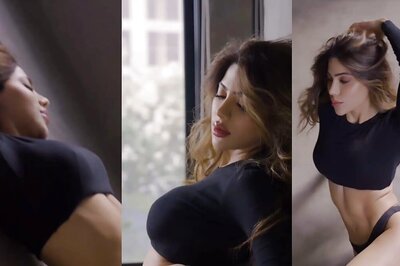
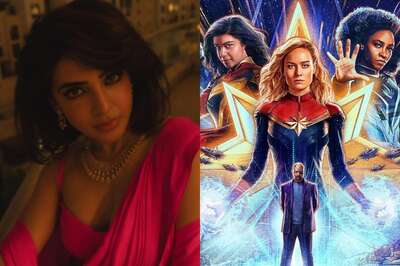


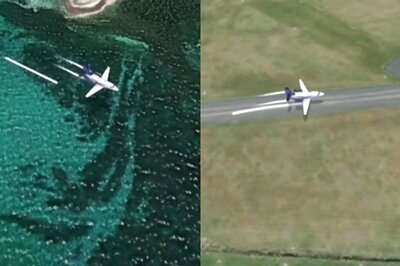

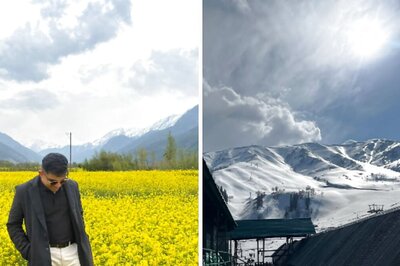

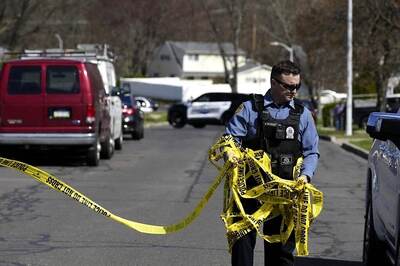
Comments
0 comment